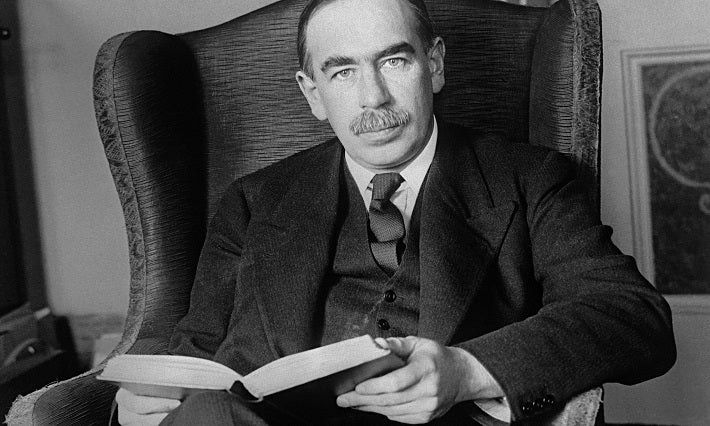Britain Should Exit Keynesianism, Not Europe - Peter Diekmeyer

June 24, 2016
On the surface, the results of last night’s referendum mark a major turning point in Britain’s relationship with Europe. They are anything but.
Tenuous evolving relations between the island and the subcontinent, have been staples of British life for decades.
The only real winners will be the armies of government employees and their handlers that will negotiate the new truckloads worth of new agreements, regulations and side-deals, that will govern that relationship.
The reason for that is that both Europe and Britain’s economies are inspired by the philosophies of a late Brit, - John Maynard Keynes - whose big government ideas are the real cause of the sclerosis affecting the continent.
The distortions are forcing investors, - who, for generations, have been told by financial advisors to only “buy and hold” financial assets - to reexamine their strategies.
Clinton, Trump both Keynesians
These same challenges are affecting much of the rest of the world. For example in the U.S. this week, both Hillary Clinton and Donald Trump promoted Keynesian policy proposals, designed to boost a slagging US economy. Trump promised tax cuts. Clinton prioritized infrastructure spending.
Neither explained how they would pay for their plans.
Tax, spend, borrow and print proposals, rooted in Keynes’s General Theory of Employment, Interest and Money, have been staples in US politics, for decades.
However this time around, the devastating effects of ideas first outlined in Keynes’s magnum opus - which celebrates its 80th birthday this year - are becoming increasingly obvious, both in Britain and the US.
The perverse and unforeseen effects of Keynesian, as it is practiced today, include:
An increasingly unstable global financial system
Global consumer, business and public sector debts total more than $200 trillion according to McKinsey & Company (as of 2014). These unprecedented levels are far higher (more than 40%) than prior to the 2007-2008 global financial crisis, which world governments essentially borrowed and printed their way out of.
This indebtedness is creating inherent growing instability because it is making economies more vulnerable to future crises. Worse it is leaving governments, businesses and individuals, with less manoeuvre room to respond to them.
Massive environmental despoliation
Opponents of Keynesian economics, - including Friedrich Hayek, Ludwig won Mises and Murray Rothbard, - warned from the start, that these policies would lead to “mal-investments.”
That benign word doesn’t even begin to describe the massive environmental despoliation caused by government actions (such as those proposed by Clinton and Trump) which incentivize immediate consumption, as opposed to savings, environmental stewardship and investments in more efficient technologies.
At a minimum these spin-off effects include trillions of dollars’ worth of resources used up, virgin forests and arable land gutted, not to mention air polluted, which otherwise would have remained pristine. This is not to say this would not have eventually occurred in later generations. However neo-Keynesian economics unquestionably sped up the process.
A generation of impoverished youth, unable to reproduce itself
Keynesian borrow, print and spend policies also amount to a massive transfer of resources to the baby boomer generation, from today’s young. This is most quantifiable in the form of unfunded and deferred pension and health care costs and the record numbers of youth currently living with their parents.
The net result is a generation of western youth so impoverished relative to its predecessors, that it will be among the first in recorded history unable to afford to have enough kids to reproduce itself – as measured by birthrates in most Western countries that have fallen below replenishment levels.
Government, central bankers and academics take control
The turn that Keynesian economics has taken is particularly disappointing, because the General Theory, was written amidst the widespread suffering of the Great Depression. The pamphlet provided good arguments in favor of some government involvement in the economy, particularly during times of great stress.
However in the ensuing years, politicians, central bankers and academics, have progressively used Keynes’s work to gradually take control all aspects of the economy, and to steer resources to their favored interest groups.
This of course has created bubbles throughout the system, particularly in the equities, fixed income and housing markets, which have left investors with fewer options.
Betting against the neo-Keynesians
This somewhat explains the increasing attraction of precious metals, which have steadily grown in popularity during the four decades since 1971, when the US government defaulted on its obligation to back the dollar with gold.
This removed the last check on the expansion of the public sector. Henceforth if governments wanted to spend money, they would no longer have to increase taxes, or even borrow the funds: they could simply print whatever they needed.
The one group that wasn’t fooled was investors in precious metals and other hard assets, whom, since publication of the General Theory, have seen the value of their holdings steadily increase relative to cash.
Whether that will continue is anyone’s guess. However given the massive distortions inherent in current interpretations of Keynes’s work, coupled with the new uncertainties related to the Brexit negotiations, some hedging seems like a good bet.
Don’t miss a golden opportunity.
Now that you’ve gained a deeper understanding about gold, it’s time to browse our selection of gold bars, coins, or exclusive Sprott Gold wafers.
About Sprott Money
Specializing in the sale of bullion, bullion storage and precious metals registered investments, there’s a reason Sprott Money is called “The Most Trusted Name in Precious Metals”.
Since 2008, our customers have trusted us to provide guidance, education, and superior customer service as we help build their holdings in precious metals—no matter the size of the portfolio. Chairman, Eric Sprott, and President, Larisa Sprott, are proud to head up one of the most well-known and reputable precious metal firms in North America. Learn more about Sprott Money.
Learn More
You Might Also Like:
















Looks like there are no comments yet.